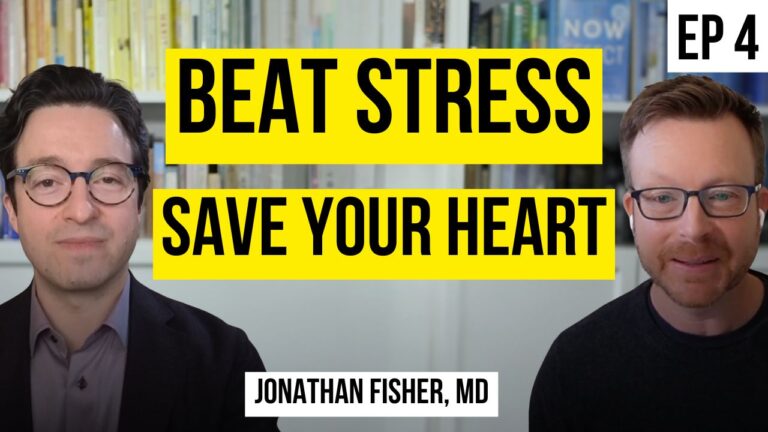
Personal Growth

Founder and Psychologist
by Dr. Elisha Goldstein
“Our emotions affect our physical heart. We don’t have a social heart emoji that’s separate from our physical heart. When I am hugging a friend or a loved one, our hearts are at ease.” – Dr. Jonathan Fisher
We discuss:
SHOWNOTES
In today’s fast-paced world, where stress and burnout have become common, we often overlook the profound connection between our emotional health and our physical well-being. Dr. Jonathan Fisher, a Harvard-trained cardiologist, and author of Just One Heart, joins me in this thought-provoking conversation about how emotional health can directly influence heart health, longevity, and overall well-being.
The Rabbit Effect: The Healing Power of Compassion
We begin with an intriguing story from 1978 that highlights the power of compassion on physical health – The Rabbit Effect. In a heart study conducted by Dr. Robert Narum, a small group of rabbits fed the same high-fat, high-cholesterol diet showed 60% fewer blockages in their heart arteries. Why? Because these rabbits received compassionate care: they were petted, spoken to, and loved before their meals. The scientific breakthrough from this experiment suggests that compassion can have a powerful, protective effect on heart health, which became the foundation for Dr. Fisher’s book.
Compassion and Burnout: The Role of Emotional Health
Dr. Fisher shares his personal experience with burnout as a physician. Despite being a dedicated cardiologist, he found himself overwhelmed by the emotional toll of caring for others without tending to his own emotional well-being. As he reflects, “I had my own unaddressed emotional wounds,” which compounded the stress of his demanding career. Over time, he discovered that healing doesn’t just come from medical treatment but from addressing the emotional, social, and spiritual health of both patients and providers.
We dive into the physiological effects of chronic stress, which impacts the heart and mind. Research has shown that when we’re stressed, the body reacts by increasing heart rate and blood pressure, preparing us for action. However, if this stress becomes chronic, it can damage our organs and hinder emotional resilience.
Healing Through Laughter and Connection
Laughter, as simple as it sounds, can also be a powerful healing tool. Dr. Fisher shares how laughter yoga can trigger the release of oxytocin, serotonin, and dopamine – the “feel-good” hormones that lower stress and improve heart function.
“When we laugh, our heart rate slows down, blood pressure drops, and our breathing deepens” – Dr. Jonathan Fisher
These positive physiological effects of laughter help us reset and build resilience against the stresses of life. Building deeper, more meaningful connections with others, Dr. Fisher argues, is essential for heart health and emotional longevity. It’s not just about avoiding stress, but actively nurturing relationships that bring joy and support. Whether it’s through laughter or genuine compassion, these connections become the foundation of a longer, healthier life.
Setting Boundaries: Protecting Your Emotional Health
Dr. Fisher also addresses the challenge of setting boundaries—something many of us struggle with in both personal and professional settings. “The hardest part is not the setting of the boundary; it’s the fear of the repercussions of setting it,” he admits. He shares how saying “no” to work-related requests, for example, was a crucial part of his journey to emotional and physical health.
“Empathy for others is important, but we also need to have empathy for our own needs” – Dr. Jonathan Fisher
The Science Behind Emotional Contagion
The conversation continues to explore emotional contagion—the idea that emotions are contagious, both positive and negative. “Generosity and kindness spread, just like negativity,” Dr. Fisher notes. Positive emotions can create ripple effects, improving our mood, health, and relationships. This highlights the importance of creating an environment filled with compassion and positivity—not just for our own health, but to help others thrive too.
The Intersection of Mindfulness and Emotional Health
Dr. Fisher emphasizes that mindfulness—being present and aware—can help manage negative emotions and cultivate compassion. “Mindfulness isn’t about thinking more,” he shares. “It’s about being more in tune with your body.” He discusses the simple practices that have supported him through tough times, like focusing on his breath or noticing tension in his body during stressful moments. These practices have helped him shift his focus away from the negative and back toward what’s nourishing and life-affirming.
A Heartfelt Conclusion
The heart, both physically and emotionally, is central to our well-being. As Dr. Fisher concludes, “The only way forward from this conflicted time is to overcome negativity bias, to realize that we are one, and to embrace compassion.” The story of the rabbits, the healing power of laughter, and the importance of boundaries and self-compassion all remind us that emotional health is the key to a long, vibrant life.
If you enjoyed this and found it supportive, I’d love for you to consider one other person who might benefit from this message and send it on to them. They can listen to this episode of Emotional Longevity podcast or read this blog.
If you are ready to take your emotional health to the next level, I invite you to join my Emotional Health Coaching Program, Uncover the Power Within. Just as we’ve discussed the power of compassion and emotional awareness in this blog, this program offers practical tools, evidence-based strategies, and a supportive community to help you build emotional strength, heal from burnout, and cultivate lasting well-being – so you can thrive in all areas of life.
Subscribe here to be the first to hear when the next episode of the Emotional Longevity Podcast releases, and for more insights on emotional resilience and well-being. Take care of yourself, inside and out.